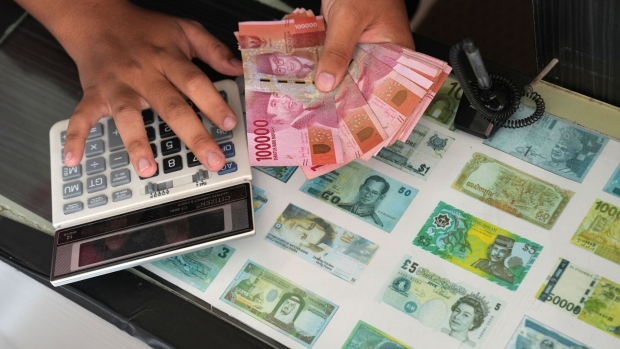Apr 24, 2024
Indonesia Rate Hike May Not Be Enough to Spur a Rally in Rupiah
, Bloomberg News

(Bloomberg) -- Bank Indonesia’s interest-rate hike may help curb any short-term weakness in the rupiah but is not enough to spur a rally in the currency, according analysts and strategists.
The rupiah’s revival will depend on whether Bank Indonesia’s policies can attract foreign inflows, which may lag given low relative spreads offered by local bonds over US Treasuries, they said. Expectations of Federal Reserve rate cuts are also key, they said.
Here’s what analysts and strategists had to say:
Jon Harrison, managing director for emerging-market macro strategy at GlobalData TS Lombard in London
“I think it’s not going be enough to return stability to the rupiah. We’re going to still see further depreciation and what happens next will depend a lot on inflation and then global conditions as well.”
Concerning Indonesian bonds, “there is a risk that there could be more outflows. Of course the rate hike helps to stabilize that, but I think it’s not enough to actually bring people flooding back. That will require either more hikes or change in external conditions which takes the pressure off inflation.”
Jerome Tay, investment manager of Asia fixed income at abrdn in Singapore
Regarding Indonesian government bonds, “I think we’ll not be increasing our positions, but it’s really on the back of the external environment. We need more clarity on that. But I wouldn’t deny valuations are looking more attractive now.”
Aditya Sharma, an emerging market strategist at Natwest Markets in Gurugram, near New Delhi
“The rate decision should be marginally positive for the rupiah. Repatriation-related flows led by dividend payment seasonality in April and May might continue to pressure the rupiah but BI is likely to lean against currency weakness via FX interventions and by stepping up support,” for the currency.
Still, “portfolio inflows could still struggle given the low relative premium for IndoGB vs US Treasuries and as investors will be cautious on local assets given the volatility in the rupiah. SRBI yields look relatively attractive but investors might find more favorable yields elsewhere in EM in LatAm and CEEMEA”
Frances Cheung, a rates strategist at Oversea-Chinese Banking Corp in Singapore
“Although the market had prepared for a hike to some extent, the materialization of it may still lead to some weakening in IndoGBs as initial reaction. The dilemma here is that domestic demand may prevent IndoGB yields from rising to levels that are perceived as appealing to foreign investors. A lower US yields environment is needed, after all, for inflows to make a strong comeback.”
Alan Lau, a strategist at Maybank in Singapore
“The hike by BI today should help provide some support for the IDR. However, external developments especially those related to US data remain the major driver near term. Whether the USD/IDR pair can decisively break below the 16000 support would also depend upon how US economic data pans out.”
Mingze Wu, a trader at StoneX Financial in Singapore
“The hike will support IDR against weakening further vs USD, and that might just be what the country needs to lower fuel import costs.” It will also help “stem any outflow of foreign funds that is scared of their capital depreciating.”
Jeffrey Zhang, an emerging markets strategist at Credit Agricole in Hong Kong
“We expect BI to maintain the hawkish tone, and would further improve the existing SRBI tools to attract foreign flows, or even with a re-enactment of the existing DHE policy (about exporters’ profit) to enhance onshore FX. In the near-term, the IDR performance will mainly depend if the upcoming policies from the BI will help to revert the recent outflows in Indonesia’s financial account on the back of the higher-for-longer USD rates”
Mohit Mirpuri, a fund manager at SGMC Capital in Singapore
“Investors should view this forward-looking action positively for Indonesian equities as domestic demand remains resilient, with GDP per capita expected to cross $5,000. We do not expect consumption trends or credit growth to decline on the back of this rate hike and hence remain positive across consumer, tech and banking sectors”
--With assistance from Malavika Kaur Makol and Eduard Gismatullin.
(Updates with additional comments)
©2024 Bloomberg L.P.






